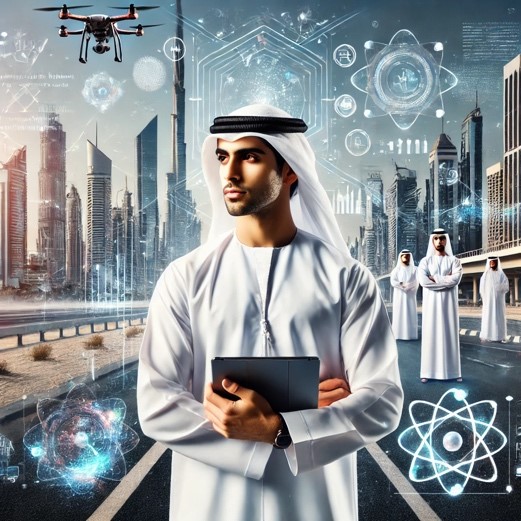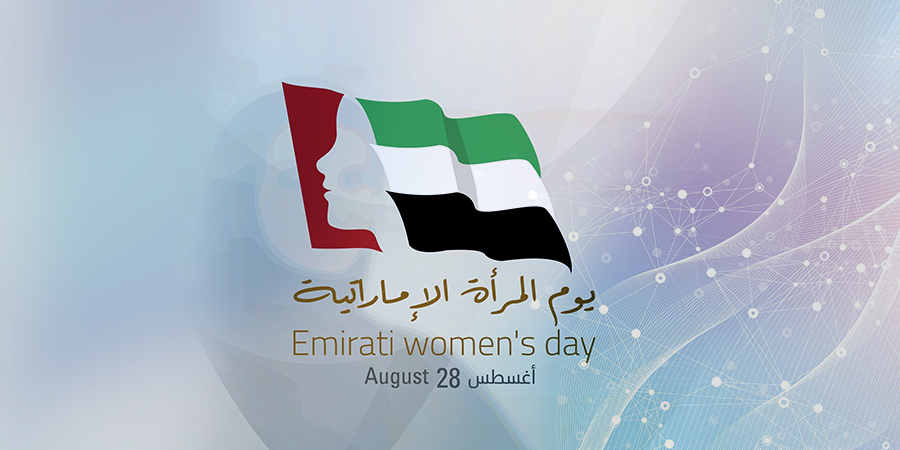Fifty-six percent of graduates in Science, Technology, Engineering, and Mathematics (STEM) courses at government universities in the United Arab Emirates (UAE) are women, according to the country’s Gender Balance Council, indicating a significant stride in promoting gender equality.
Over the years, Emirati women have increasingly become key players in the technology sector, driving innovation and making substantial contributions to the UAE’s digital transformation.
Established in 2015 by Her Highness Sheikh Fatima bint Mubarak, the Mother of the Nation, this year’s commemoration of Emirati Women’s Day builds upon last year’s success, reflecting on the collaborative efforts that have fostered an inclusive environment for Emirati women and their different contributions to various fields.
With the government’s commitment to promoting gender equality, the remarkable representation of Emirati women in the traditionally male-dominated technology landscape is an inspiration to young girls to pursue careers related to the field.
Related: Women Should Have Safe and Meaningful Access to ICT, Digital Tech
Navigating the Challenges Faced by Emirati Women in Tech
In 1975, women only accounted for 2% of the UAE’s workforce, emphasizing gender disparity during the country’s early developments.
Despite the UAE being a regional leader in promoting gender parity, Emirati women may face gender bias and stereotypes in the tech industry, manifesting in recruitment and even in leadership roles.
To eliminate gender discrimination in the tech workforce, the UAE’s satellite communications company, Yahsat, provides a fair selection process, delivering equal career opportunities for both men and women.
Additionally, the company encourages gender diversity, avoiding the domination of one gender in functional teams, interviews, and assessment panels.
In 2023, Yahsat appointed 13 women in key positions, following the implementation of their gender balance policy in 2022, amplifying their dedication to gender diversity.
Furthermore, UAE telecommunications company, e&, has underscored the need for the right encouragement and support for women to remain in the workforce. In addition, e& emphasized micro-inequities, such as a list without a female candidate, as another reason why women hold back in the male-dominated world of technology, eventually leading to a lack of women in leadership positions.
In 2018, the UAE Cabinet issued a law governing equal wages for both men and women to resolve challenges regarding unequal wages based on gender.
However, gender biases do not only occur in workplaces but also in artificial intelligence (AI) systems. Driven by biased inputs and data pools, 85% of AI-related systems tend to produce biased results, according to a study by Gartner. Once AI is trained on datasets that predominantly include images of men in the tech sector, it may struggle to generate photos of women in similar contexts.
To further test this theory, Telecom Review asked OpenAI’s DALLE.E image generator to generate the ideal profile of a UAE STEM graduate. It responded with this:
 DALLE.E AI-Generated Image
DALLE.E AI-Generated Image
This AI-generated image reiterates the level of gender bias already found in publicly available AI LLMs. Thus, addressing AI’s stereotypes against gender, race, and age is paramount to ensure the fairness and inclusivity of today’s modern technology, a critical aspect of shaping a digitally inclusive future.
Also Read: WomenTech Leaders: Success Stories and Promising Experiences
Gender Equality Initiatives in the UAE’s Telecom Industry
Gender equality is a significant aspect of achieving the Sustainability Development Goals (SDGs) which form the foundation of sustainable development.
The UAE envisions a workforce recognizing the potential of both genders in technology. According to the Gender Inequality Index (GII) of the United Nations Development Programme’s Human Development Report 2024, the UAE impressively ranked seventh globally and first regionally, highlighting the country’s efforts in bridging the gender gap.
In 2023, the UAE launched the National Policy for Empowerment of Emirati Women – 2031, aiming to facilitate female representation and participation across all sectors, including telecommunications. This includes support for the development of programs for digital technologies targeting women.
The International Telecommunication Union (ITU) also acknowledges the efforts of the UAE’s Telecommunications and Digital Government Regulatory Authority (TDRA) in empowering Emirati women to pursue studies and careers in STEM.
UAE telecommunications operator, du, achieved 40% Emiratization of its workforce in 2023, providing more career opportunities. Remarkably, 52% of this Emirati workforce are women, highlighting the company’s commitment to gender equality and inclusivity.
Different organizations in the UAE have fostered a supportive environment for women in technology, including Emiratis, where mentorship and skill-building initiatives are provided. This provides a platform for women to excel in careers in technology, contributing to shaping the future of the UAE’s tech industry.
Based in Dubai, diversity, equity, and inclusion (DEI) impact agency, Aurora50, launched the ‘Fixing the bAIs’ initiative which was recognized as a concrete solution to address gender bias in AI, after being presented at the United Nations, ultimately inspiring other countries to implement equitable AI policies.
Additionally, the UAE strengthened its stance on women's empowerment by becoming a signatory to the United Nations Convention on the Elimination of All Forms of Discrimination against Women (CEDAW) in the early 2000s.
Also Read: UAE Fosters Gender Equality as Emirati Women Take on Science, Tech Roles
Emirati Women in Tech and Leadership Roles in the Industry
Emirati women can offer strategic alliances, extending their impact on technology and innovation.
In a notable feat, the efforts of the UAE’s Ministry of Industry and Advanced Technology are led by Her Excellency Sarah Bint Yousif Al Amiri, who spearheaded its research and development.
Remarkably, she was also at the forefront of the Emirates Mars Mission: Hope Probe in 2021 as the chairwoman of the UAE Space Agency. The Hope Probe was the UAE’s first mission to orbit a satellite around Mars, delivering complete imagery of the Martian atmosphere and its layers.
Notably, women accounted for 34% of the Emirates Mars Mission team and 80% of the Hope Probe’s operation.
du’s (commercially rebranded from Emirates Integrated Telecommunications Company) commitment to encouraging women to take on leadership roles in the technology sector was emphasized through the appointment of its first Emirati woman CXO, Hanan Ahmed. Taking on the leadership role as du’s Chief Regulatory Affairs and Risk officer, she broke gender barriers, ensuring alignment with regulatory obligations and customer expectations.
In an exclusive interview with Telecom Review, Ahmed emphasized du’s support in the country’s transformational projects, including the “We the UAE 2031 Vision” and the information, communications, and telecommunications (ICT) regulatory sandbox initiative.
Consequently, due to the company’s efforts in gender parity, du became the first telco company in the Gulf to demonstrate 20% women representation at the board level.
Investments in female-focused programs underscore du’s commitment to diversity and inclusion, including presentations related to ICT in UAE schools to attract young girls’ involvement in the tech field.
Another UAE telecom operator, e&, emphasized in its July 2024 press release that Emirati women account for 79% of their total female employees—the highest in the company’s longstanding history.
UAE satellite communications company, Al Yah Satellite Communications (Yahsat), is also committed to fostering gender equity and inclusion, eliminating discrimination, and encouraging women empowerment within its workforce.
Alongside the significant presence of women in tech, Abu Dhabi’s Technology Innovation Institute (TII) is actively highlighting the expertise of its AI leader and visionary, Dr. Ebtesam Almazrouei. She serves as the institute’s executive director and acting chief AI researcher. With her deep knowledge across various industries, including 5G technology and the Internet of Things (IoT), Dr. Almazrouei has developed innovative solutions for telecom companies such as Etisalat.
Telecom Review Exclusive Interview: Breaking Glass Ceilings, Building Bridges: Celebrating Women's Leadership in ICT
Final Thoughts
The quest to bridge the gender gap and empower Emirati women has been building momentum in recent years. Public and private initiatives reflect the UAE’s commitment to gender balance and support for female talent and skills, citing the instrumental role they play in shaping the future of the country’s digital landscape.
As the UAE becomes a leader in global digital transformation, it is important to recognize the unique blend of talent, skills, and perspectives Emirati women possess, proving their pivotal involvement in the technological industry.
When given the opportunity, Emirati women can thrive as pioneers of innovation, driving the future of a more advanced country. After all, they hold untapped reservoirs of knowledge, talent, and capabilities that could catalyze the UAE’s success in future innovations.
Read More: Empowering Change: Women Driving the ICT Sector Forward











